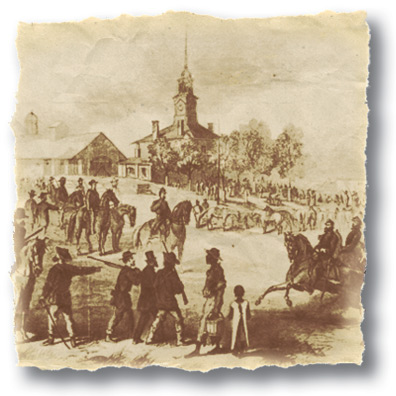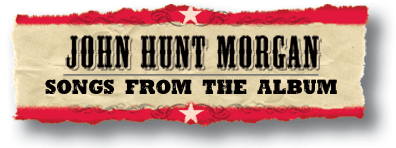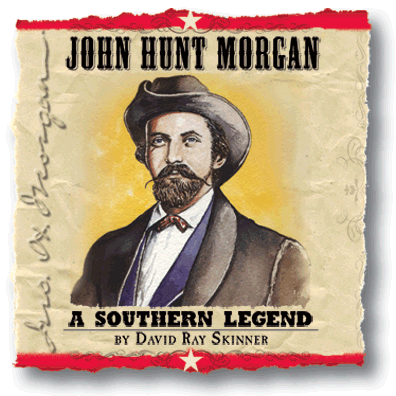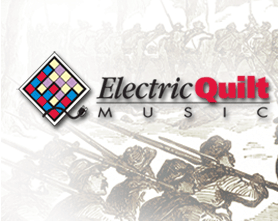
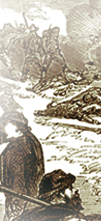
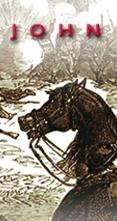
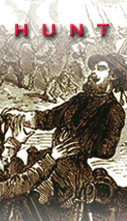
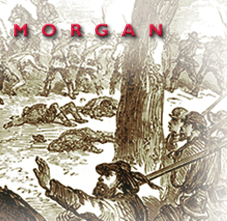
The album begins and ends with the death of John Hunt Morgan. The album's songs are the life that flashes before his eyes.
Becky
Morgan married his business partner's sister, Rebecca Bruce in 1848. Becky became ill, and Morgan took her from doctor to doctor traveling everywhere from New Orleans to Hot Springs in search of a cure, but to no avail. After years of constant pain, she died on Sunday afternoon, July 21, 1861. To hear the song, click here.
Oh Kentucky!/Ride Away
In 1861, Kentucky remained neutral. Morgan, like most Kentuckians was forced to choose sides. As a pro-Southern business owner, he flew a rebel flag over his factory, and as the commander of a militia, he was clearly a threat to the Union. When he smuggled militia rifles out of town, leaving empty crates for the Federals to "confiscate," his arrest warrant was issued. He lost his factory, and having already lost his wife, he had nothing to live for but the new republic.
Butternut Grey
Morgan joined the Confederacy and assumed his command in the Autumn of 1861. He was eventually joined by his brothers, Tom (who had enlisted in early July, 1861), Cal, Charlton, Dick, and later on, Key. The term Butternut Grey refers to the color of the Confederate uniforms, dyed from the bark of the butternut tree. To hear the song, click here.
Cheer Boys, Cheer
This was the Kentucky marching song, and was one of the tunes that Morgan's men loved to sing going into battle.
Lightning on the Wire/Communication Breakdown
George Ellsworth was the Canadian telegraph operator Morgan enlisted to confuse the enemy by disrupting their lines of communication. He would "milk the wires" for intelligence and then send deceptive messages to the Union command. During one raid, he tapped the line during a thunderstorm earning himself the name, "Lightning."
Asylum Raid
When Morgan learned that the 4th Ohio had camped out on the grounds of the Lunatic Asylum outside Nashville, he and his men disguised themselves in blue and picked off the unsuspecting Yankees. After taking over 80 prisoners, the ploy was discovered, resulting in a skirmish in the shadow of the asylum. The song is a commentary on the insanity of war.
Morgan's War-Song
This was a poem written by Gen. Basil W. Duke, Morgan's brother-in-law and second-in-command. When Morgan liberated Hartsville, Tennessee from Union occupation, he found an abandoned newspaper office and set up his own newspaper, The Vidette. The Vidette featured stories of Union atrocities, accounts of Morgan's "brilliant" activities, and, on the front page, Morgan's War-Song.
Black Clouds Above the L&N
Written from Basil Duke's perspective, this song focuses on two of Morgan's raids on the Louisville & Nashville Railroad, the main supply line for Union-occupied Nashville. The first raid was on the L&N's twin tunnels above Gallatin, Tennessee. The second raid was Morgan's infamous Christmas Raid of 1862 when he successfully captured and burned several L&N bridges and more important, the Muldraugh trestles. Next to the Gallatin tunnels, the trestles were the L&N's most strategic target, and by destroying them, Morgan shut down the supply line for five weeks. To hear the song, click here.
The Congressman's Daughter
While establishing his headquarters at Murfreesboro, Morgan became acquainted with Col. Charles Ready, a prominent attorney and former U.S. Congressman. Morgan, in fact, was quite taken with Ready's daughter Martha, who was affectionately known as Mattie. After a brief courtship, they became engaged in March, 1862 and were married the following December, after which Morgan immediately left on his Christmas raid. The die was cast; his recklessness and devotion to his men would gradually be replaced by his love for Mattie.
Half-Past Chattanooga
Morgan conducted several successful raids, but the most famous, if ill-fated, was his Ohio raid. With plans to link up with Lee in Pennsylvania, he set out with 2500 men on an operation that he had kept secret from his superiors. Aided by Ellsworth's telegraph dispatches of disinformation, Morgan tore his way through Kentucky and Indiana, burning bridges and ripping up railroad tracks. By the time he crossed into Ohio he was being pursued by a number of Union regiments, and still he pushed northward. He had planned to create havoc among the general population, bringing the war to the people of the North, then cross the Ohio River and escape. Unfortunately, because of heavy rains, the river level was at a record high and, in Pennsylvania, Lee was defeated at Gettysburg. After going further north than any other Southern force and destroying several million dollars worth of property, Morgan was captured a mere 90 miles from Lake Erie. To hear the song, click here.
Mattie's Eyes
This song was taken from the letters Morgan wrote to Mattie from the prison in Ohio. There were many letters penned by the light of a candle or lantern as he wrote through the night, and they were poetic and full of love for Mattie and their expected child. To hear the song, click here.
Psalms 60/142
As a devoted churchgoer, Mattie began to draw Morgan into the church. His Bible proved to be a great comfort to him during his imprisonment. In one of his letters he confided to her that he had been studying the Psalms. The verse, "Judah is my lawgiver," is mentioned several times throughout the Psalms. Morgan may have found it ironic; Gen. Henry M. Judah was one of the Union officers who finally succeeded in trapping him.
Stars and Bars
Stars and Bars, a nickname for the Confederate flag, is Capt. Samuel Taylor's story. Taylor was one of Morgan's officers and was captured with him in Ohio. The authorities refused to treat Morgan and his men as prisoners of war and confined them to the Ohio State Penitentiary. Several escape plans were considered, but then Capt.Thomas H. Hines, surmising that an airshaft ran below their cells, proposed a plan for a tunnel. They carefully scraped through the concrete floor in one of the cells, hiding the small pieces in the bed ticking and the larger pieces in the furnace and in the carpetbag covering the hole. Once in the airshaft, they dug upward into six other cells and stopped short of breaking through, leaving a fraction of an inch of concrete on the cell floors that could easily be broken on the night of the escape. Because the outside yard was also guarded at night by vicious dogs, they knew they would have to wait for a rainy night when the dogs would be inside. But, when they heard of a prison command change, they knew there would be a detailed inspection of the cells (which would have certainly revealed the hole in cell floors, not to mention the tunnel), so they put their escape plan into action the following evening. Fortunately, it happened to rain that night, November 27, 1863, and Morgan, Taylor, Hines, and four other men escaped. Five of the men, including Morgan, successfully made it back to Tennessee, but Sam Taylor and another of the escapees were captured.
This Southbound Train
Morgan had hidden civilian clothes and money inside the tunnel along with a railroad timetable. Once in the tunnel, the seven men separated into groups. Morgan and Thomas Hines paired off and caught the midnight train out of Columbus. Morgan promptly befriended a Union officer and sat beside him for the duration of the trip. As the train rolled past the penitentiary, the Union officer said, "There's the 'hotel' where Morgan and his officers are spending their leisure." Morgan laughed and said, "Yes, I hope he stays as safe as he is now."
The Gypsy's Letter
Morgan received a letter from a woman in Kentucky he didn't know. The woman begged Morgan to stay put--she warned that if he attempted to come south and continue his raids, his life would be in grave danger. Morgan chose to ignore the advice and headed toward East Tennessee.
Cheer, Boys, Cheer
Once back South, Morgan's military career faltered. Because of his unauthorized raid into Ohio, his superior officers not only didn't trust him, they actively sought to court-martial him. Plus, the Union Army, embarrassed and furious over his escape, vowed to recapture him, dead or alive. In this version, the raiders' marching song is played as a lament.
The Other Side
This was written as an Appalachian folk hymn. In this context, it's a premonition for Morgan and his men.
The Greene County Line
On September 4, 1864, Morgan and his men were surprised by Union troops in Greeneville, Tennessee. Morgan had promised Mattie that he would never again be taken prisoner and was shot in the back as he ran for his horse. Morgan's brother-in-law, Basil Duke, assumed command of the remnant of his ragtag cavalry and survived until the end of the war. They eventually escorted Confederate President Jefferson Davis to the banks of the Savannah River on the Georgia-South Carolina line where they divided up the last gold of the Confederacy. Trapped and left with no escape, they surrendered a few days later. Morgan left a widow and a daughter, Johnnie, who was born a few months after his death.
© 2019 Electric Quilt Music. All rights reserved.
